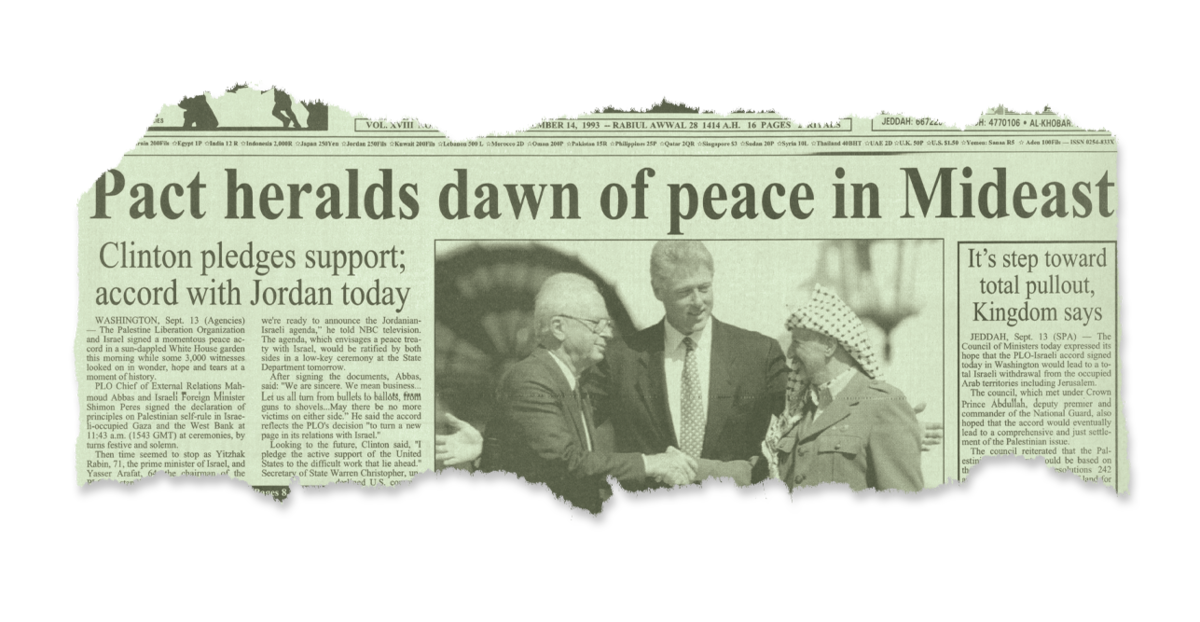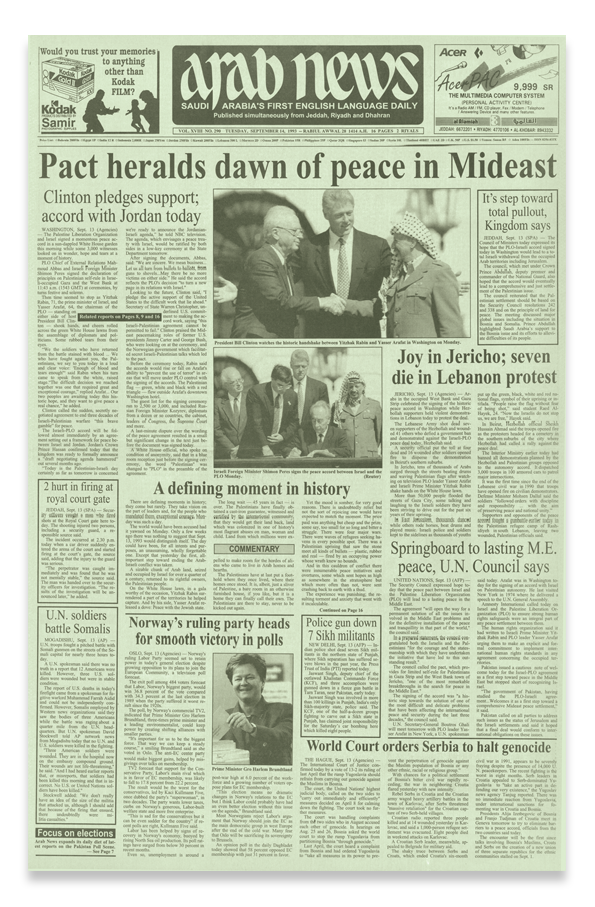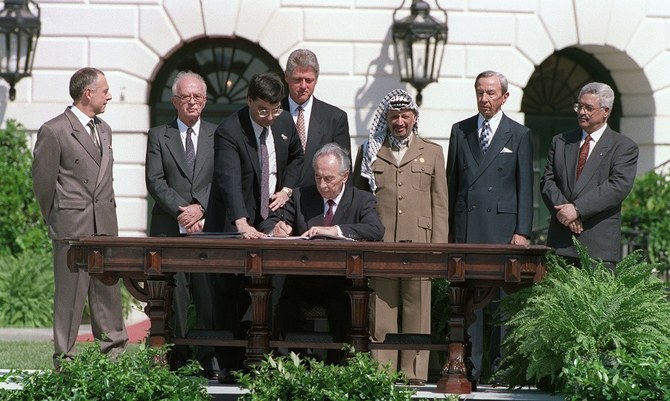Hope arising from the landmark deal was quickly cut short by violence, including the killing of Israeli leader Yitzhak Rabin
Summary
After the excitement of the Egyptian-Israel peace accords of 1978 and 1979 tapered off, there was an 11-year lull in which peace was stymied. Jordan refused to negotiate with Israel without the latter first agreeing to recognize Palestinian rights. Israel’s Prime Minister Menachem Begin refused to recognize Palestinian rights. The peace with Egypt went cold as criticism continued to mount from other Arab countries that Egyptian leader Anwar Sadat had “sold out” the Palestinians and the Arab cause.
Then came an intervention by US President George H.W. Bush, who sought to capitalize on goodwill in the region after forcing Iraq’s Saddam Hussein out of Kuwait during the Gulf War on Feb. 28, 1991. Using friendships among Gulf Arab countries, Bush spoke about the concept of “territory for peace” and also the “fulfilment of Palestinian rights.”
It wasn’t until Yitzhak Rabin was elected Israel prime minister in 1992 that serious discussions began directly between Israelis and Palestinians leading up to the Oslo Accords, signed in September 1993.
Chicago: As a Palestinian, I grew up under the shadow of the pain and suffering of the Arab-Israeli conflict. Israeli violence during the 1947 and 1948 war forced my father’s family tflee their homes in West Jerusalem and live for more than two years in the squalor of a refugee camp in Jordan until my father could help bring them to the US in 1951.
My mother and her family in Bethlehem were forced to suffer through constant Israeli military assaults after the war, even though they lived under Jordanian control and there was an uncertainty about whether they could survive. They fled to the sanctuary and welcoming arms of the diaspora, living in Colombia and Venezuela.
They lost much. And until today, more than 10 acres of family land on my mother’s side adjacent to the Israel settlement of Gilo remains under Israeli control and outside our reach simply because we are Christian Palestinians, not Jews.
That cumulative weight of suffering was lifted from me as I sat and watched my hero, Yasser Arafat, shake the hand of our oppressor, Yitzhak Rabin, during the signing of the Oslo Peace Accords at the White House on Sept. 13, 1993.
Rabin was a monster to Palestinians. In January 1988, as a general, Rabin ordered his soldiers to “break the bones” of Palestinian civilians identified as “inciters” at protests against Israeli policy. Rabin was never charged, but his lower-ranking officers faced a public outcry that was covered up by Israel’s government and the pro-Israel news media.
Yet, we were willing to set that aside for an Israeli who was willing for the first time to recognize Palestinians as a people — a people denied by all of his predecessors, including Golda Meir, a Milwaukee school teacher who became an immigrant prime minister and once cruelly declared the Palestinians “did not exist.”
Yet on Sept. 13, 1993, we were willing to put the pain of the past aside and move forward with a new beginning at “a great occasion of history and hope,” as President Bill Clinton declared at the opening of the momentous event.
I remember grabbing a chunk of grass from the White House lawn in front of the stage as a souvenir to place in the program that was distributed to Palestinians and Israelis.
We all sat near each other in different groups and sections, Jews and Arabs, with relief as the ceremony began.
Key Dates
-
1March 6, 1991: After the Gulf War, President George H.W. Bush steps up US involvement in the Middle East, including championing an Arab-Israeli treaty based on the “territory-for-peace” and fulfilment of Palestinian rights. Oct. 30 to Nov. 1, 1991: At the Madrid Peace Conference, US Secretary of State James Baker invites Israel to meet with representatives of several Arab countries to pursue peace and establish self-rule for the Palestinians. Israel objects to direct talks with the PLO, and Palestinians from the Occupied West Bank partner with the Jordanian delegation to explore peace prospects. July 13, 1992: Yitzhak Rabin is elected prime minister and vows to progress with peace negotiations and the establishment of Palestinian self-rule, but enters into secret, direct talks with the PLO in Norway. Sept. 13, 1993: With President Bill Clinton hosting, PLO Chairman Yasser Arafat and Israeli Prime Minister Yitzhak Rabin begin the process of Palestinian self-government, with the Palestinians recognizing Israel and Israel recognizing the PLO and the establishment of the Palestine National Authority. The agreement is signed by Mahmoud Abbas and Shimon Peres. Oct. 14, 1994: The Nobel Committee awards the Nobel Peace Prize to Yasser Arafat, Yitzhak Rabin and Shimon Peres for signing the Oslo Accords. Oct. 26, 1994: Progress with the Palestinians opens the door to a peace agreement between Israel and Jordan in a ceremony in the Arava Valley, north of Eilat in Israel and near the Jordanian border. Feb. 25, 1994: American-born Benjamin “Baruch” Goldstein, wearing an Israeli military uniform and carrying an automatic weapon, enters Ibrahimi Mosque in Hebron and massacres 29 Muslims as they pray, wounding 125 others. April 6, 1994: On Israel’s Holocaust Memorial Day, a Hamas suicide bomber kills eight Israelis and injures 55 others. Nov. 4, 1995 Yitzhak Rabin is shot by an Israeli extremist who Rabin’s family claim is a follower of the right-wing extremist politics of Ariel Sharon and Benjamin Netanyahu. Rabin dies the following morning.
-
2The first intifada erupts after an Israeli truck strikes a Palestinian station wagon carrying Palestinian workers into the Gaza Strip near the Jabalaya refugee camp. The intifada brings widespread violence and disruption to Israeli lives in Gaza, the West Bank and in Israel.
-
3At the Madrid Peace Conference, US Secretary of State James Baker invites Israel to meet with representatives of several Arab countries to pursue peace and establish self-rule for the Palestinians. Israel objects to direct talks with the PLO, and Palestinians from the Occupied West Bank partner with the Jordanian delegation to explore peace prospects.

-
4Yitzhak Rabin is elected prime minister and vows to progress with peace negotiations and the establishment of Palestinian self-rule, but enters into secret, direct talks with the PLO in Norway.
-
5With President Bill Clinton hosting, PLO Chairman Yasser Arafat and Israeli Prime Minister Yitzhak Rabin begin the process of Palestinian self-government, with the Palestinians recognizing Israel and Israel recognizing the PLO and the establishment of the Palestine National Authority. The agreement is signed by Mahmoud Abbas and Shimon Peres.
-
6The Nobel Committee awards the Nobel Peace Prize to Yasser Arafat, Yitzhak Rabin and Shimon Peres for signing the Oslo Accords.

-
7Progress with the Palestinians opens the door to a peace agreement between Israel and Jordan in a ceremony in the Arava Valley, north of Eilat in Israel and near the Jordanian border.
-
8American-born Benjamin “Baruch” Goldstein, wearing an Israeli military uniform and carrying an automatic weapon, enters Ibrahimi Mosque in Hebron and massacres 29 Muslims as they pray, wounding 125 others.
-
9On Israel’s Holocaust Memorial Day, a Hamas suicide bomber kills eight Israelis and injures 55 others.
-
10Yitzhak Rabin is shot by an Israeli extremist who Rabin’s family claim is a follower of the right-wing extremist politics of Ariel Sharon and Benjamin Netanyahu. Rabin dies the following morning.

The actual peace documents were signed by Israel’s Foreign Minister Shimon Peres and the Palestine Liberation Organization’s Mahmoud Abbas as Clinton, his Russian counterpart, Rabin and Arafat looked on. Then, with Rabin on his right and Arafat on his left, Clinton nudged the two leaders together and they shook hands.
The Oslo Peace Accords included recognition of certain rights. The Palestinians openly recognized Israel’s “right to exist,” a major concession at the time, while Israel only recognized that Palestinians would have a process leading to limited self-rule.
Under the agreement, Israel never agreed to recognize Palestinian statehood, but instead vaguely defined Palestinian self-government in the occupied territories and to withdraw its armed forces from much, but not all, of the West Bank.
It was a foundation for a promise that would lead to the creation of a Palestinian state in five years, but that was never written down or documented. It was interpreted.
And yet that was such an overwhelming relief for many, including my family. My wife is Jewish, and we traveled through Israel and Palestine
between 1994 and 1995. Although the agreement did not spell out true freedom, it created an atmosphere of hope. Palestinians and Israelis, for the first time, got to know each other as potential friends, not enemies.
But the peace that Oslo promised was quickly cut short, in a large part because of the violence by Israeli fanatics that sparked Palestinian outrage and counter-violence.
After shaking Arafat’s hand, Rabin declared: “We who have fought against you, the Palestinians, we say to you today, in a loud and a clear voice, enough of blood and tears ... enough!”
He should have spoken to his own people, though.

“Goosebumps, it was one of those events that gives you goosebumps,” said one excited observer at the American Embassy (in Riyadh) where a delegation of dignitaries, academics, and journalists viewed the momentous signing.”
Afshin Molavi in Arab News, Sept. 14, 1993
On Feb. 25, 1994, only five months after the Oslo signing, Chicago Dr. Benjamin “Baruch” Goldstein, wearing an Israeli military uniform and carrying an automatic weapon, entered the Ibrahimi Mosque and massacred 29 Muslims as they prayed, wounding 125 others.
The massacre prompted a wave of suicide bombings by Hamas militants opposed to the peace process, beginning with an attack at a bus stop in Afula on April 6, 1994, designated by the Israelis as “Holocaust Memorial Day,” that killed eight Israelis and injured 55 others. It was considered the first suicide attack, although there had been three other attacks, one during the intifada on July 6, 1989, and two in April and October 1993.

A page from the Arab News archive showig the news on Sept. 14, 1993.
A 27-year-old disciple of Benjamin Netanyahu, Yigal Amir, of the far-right Israeli group Eyal, assassinated Rabin, shooting him in the arm and back following a peace rally on Nov. 4, 1995. Eyal confessed that he killed the Israeli leader because he wanted “to give our country to the Arabs.” Rabin’s widow, Leah, blamed Netanyahu and Israeli extremists for Amir’s actions.
The peace quickly unraveled. Israeli and Palestinian extremists who both opposed compromise escalated their violence. Eventually, Ariel Sharon and Netanyahu took control of the country, quickly peeling back the Oslo promises.
But I will never forget one memory driving with my wife through the Jordan Valley at an Israeli checkpoint in the summer of 1995. The Israeli soldiers handed us a flower and were curious that a Palestinian and a Jew would marry.
“You’re the future,” the Israeli soldier said with a smile.
It was one of the last smiles I would ever see on the face of an Israeli soldier again.
- Ray Hanania, Arab News’ correspondent in Chicago, was invited by President Bill Clinton to help promote the Oslo Peace Accords to Palestinian and Arab Americans, meeting with Clinton, Rabin and Arafat, and witnessed the Oslo signing with other Jews and Arabs seated on the White House lawn.














